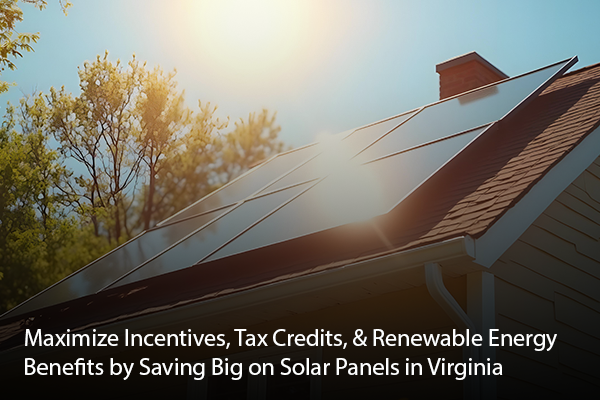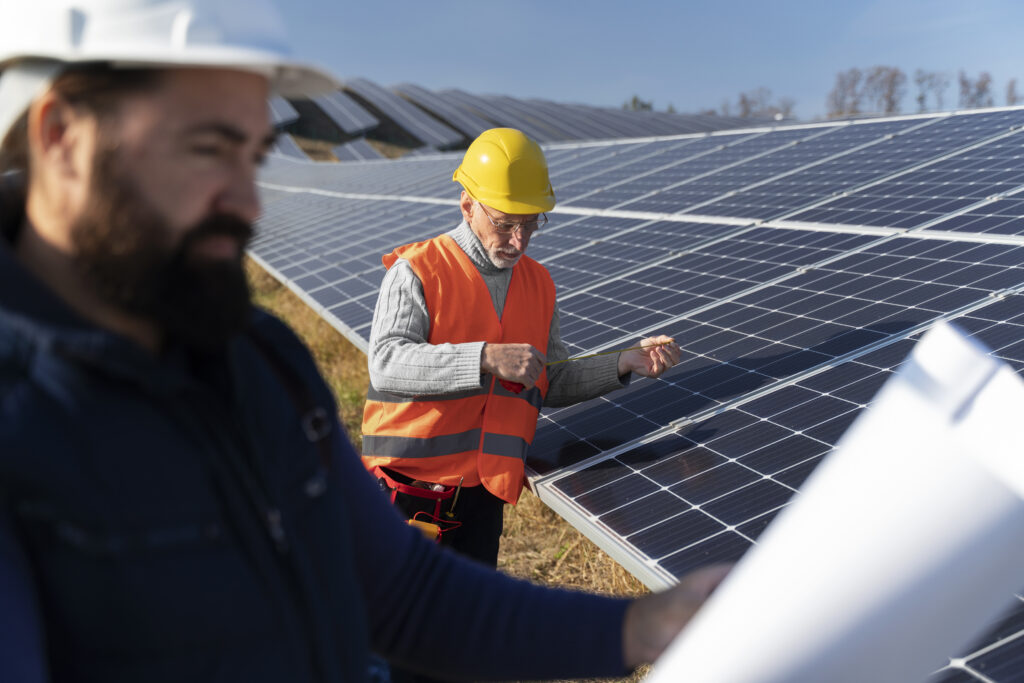Are you considering switching to solar energy in Virginia? You’re not alone! Virginia has become a leader in solar energy, ranking among the top 10 solar states in the U.S. With its solar power production reaching new heights in 2023, Virginians are embracing the future of clean energy. However, the transition to solar doesn’t have to be expensive. In this blog, we’ll explore several ways you can save money on solar panels in Virginia, including federal tax credits, property tax exemptions, and more.
If you live in McLean, Herndon, Annandale, Reston, Falls Church, Great Falls, Arlington, Alexandria City, Oakton, or Vienna, this guide will help you maximize your savings while contributing to a greener planet.
1. Save Big with the Federal Solar Tax Credit
Virginians can enjoy substantial financial incentives with the Federal Solar Tax Credit, which allows homeowners in Virginia to write off 30% of the total cost of solar panel installation on federal taxes. This includes not just the solar panels but also:
- Pre-installation upgrades to your electrical system
- The cost of installing wiring for the solar system
- Assembly and installation of the panels
- Labor, including on-site preparation, permits, and inspection costs
- Equipment such as mounting materials and inverters
For example, if your solar installation costs $30,000, you could save $9,000 on your federal taxes. This tax credit is available for installations completed between 2022 and 2032. However, note that this percentage decreases in 2033 to 26% and 2034 to 22%, so now is the ideal time to take advantage of the full 30%.
2. Property Tax Exemption on Solar Panels in Virginia
Virginia also offers a solar property tax exemption, allowing homeowners to avoid additional property taxes based on the increased value solar panels add to their property.
Here’s how it works: installing a solar energy system up to 5 MW can receive a 100% property tax exemption for up to 10 years. For systems larger than 5 MW (up to 150 MW), the exemption is 80%. Essentially, this means you will only be taxed on the value of your property as it was before you installed the solar panels. Over time, this can amount to significant savings, as solar installations often add thousands to a home’s value.
3. Earn Extra Income with Solar Renewable Energy Credits (SRECs)
Another great way to save money—and even generate extra income—is by trading Solar Renewable Energy Credits (SRECs). For every megawatt-hour (MWh) of electricity your solar system produces, you can earn one SREC, which you can sell for cash. But how? Energy companies must purchase a certain percentage of their energy from renewable sources, and buying SRECs allows them to meet that requirement.
In Virginia, SRECs are currently trading at $40 per certificate. A typical residential solar system that produces around 6-8 kW could generate approximately 10 SRECs annually, allowing you to earn an additional $400 each year.
4. Save on Energy Bills with Net Metering
Net metering is one of Virginia’s most valuable programs for solar owners. This policy allows you to return the excess electricity your system generates to the grid and receive credits on your electric bill. Virginia’s net metering program compensates homeowners at a one-to-one retail rate, which means for every kilowatt-hour (kWh) of electricity your system generates and sends back to the grid, you receive full credit on your next bill.
For most residential systems under 25 kW, this can significantly reduce your monthly energy costs. Additionally, Virginia offers a Community Solar Pilot Program, which allows homeowners to offset part or all of their electricity usage by purchasing solar energy credits from local solar farms. This is especially useful for those who may not be able to install panels directly on their homes but still want the financial and environmental benefits of solar energy.
5. Financing Options and Leasing Programs
One of the primary concerns for homeowners is the upfront cost of installing solar panels. However, various financing options and solar leasing programs available in Virginia can make the switch to solar more affordable. Many solar providers offer no-money-down financing, allowing you to pay for your system through monthly installments. Solar leasing programs can also reduce upfront costs by allowing you to lease the system and pay for its energy, often at a lower rate than traditional electricity bills.
While solar financing options may vary, they can be structured to offer immediate savings on your energy bills, making installation costs easier to manage over time.
Why Choose Atlas General Contractors for Your Solar Needs?
At Atlas General Contractors, we proudly offer expert solar installation services throughout Virginia, including McLean, Herndon, Annandale, Reston, Falls Church, Great Falls, Arlington, Alexandria City, Oakton, and Vienna. Our experienced contractors will guide you through every step of the process, from the initial consultation and system design to installation and ongoing maintenance.
By working with us, you can be assured that you’re getting the best solar technology and installation expertise. We pride ourselves on providing energy-efficient, cost-effective solutions that will lower your energy bills while increasing the value of your home.
Start Saving with Solar Panels in Virginia Today
If you’re a homeowner in Virginia, particularly in areas like McLean, Herndon, Annandale, Reston, and beyond, now is the time to switch to solar energy. With federal tax credits, property tax exemptions, and programs like SRECs and net metering, there are plenty of ways to save on the upfront installation costs and generate ongoing savings.
Contact us for a free consultation at 703-656-1500 or email us at info@atlasgc.org to start your solar journey and take advantage of all these financial benefits today.




